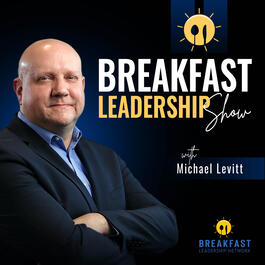
Steff Vanhaverbeke on AI, Humanity, and the Future of Work – A Realistic Look Beyond the Hype
In this episode of the Breakfast Leadership Show, Michael speaks with AI strategist and author Steff about the real-world impact of artificial intelligence on the workforce. Together, they challenge the common narrative that AI is replacing human jobs and explore how leaders can adopt AI responsibly without losing sight of the human element. AI’s Limited Impact on the Workforce Steff shares her concerns about companies prematurely laying off employees under the guise of AI adoption, emphasizing that today’s AI lacks the depth to truly replace people. Michael echoes this sentiment, noting that many organizations are jumping into AI initiatives without understanding the implications. Both agree that while AI will transform the workforce over time, we’re far from a reality where machines can replace human intelligence and empathy. Rethinking Employment Dynamics Michael and Steff dive into the nuances of AI’s effect on employment. While automation can replace certain tasks, it often leads to cost-cutting rather than meaningful innovation. Steff highlights how AI can reduce repetitive work, freeing humans to focus on creativity and strategy. The two also compare cultural differences between North America and Europe—where stronger work-life balance and social systems offer a healthier framework for integrating technology into work. AI as a Productivity Partner The conversation shifts to the potential of AI as a collaboration tool. Michael explains how AI-powered note-taking and workflow tools can enhance meetings by freeing up cognitive space and improving documentation. Steff and Michael agree that AI democratizes access to powerful tools, empowering individuals to be more productive, even as organizations struggle to integrate these systems effectively. Context Is the New Skillset Steff introduces a fascinating idea—the rise of the “context engineer.” As businesses rely on AI, she argues that human understanding of nuance, culture, and emotional intelligence will become essential to guide AI systems effectively. Context engineers will bridge the gap between data and human meaning, ensuring AI remains a support, not a substitute. What AI Can’t Replace Drawing from her book Being Replaced, Steff outlines five uniquely human skills that AI cannot automate: flexible thinking, emotional intelligence, collective intelligence, intuition, and true innovation. She underscores that while AI can simulate emotion or pattern recognition, it cannot create, connect, or empathize as humans do. Michael reinforces that innovation and adaptability have always been the cornerstones of human progress. AI as a Tool for Human Enhancement The episode closes on an optimistic note. Steff discusses her open-source framework for using AI intelligently and invites listeners to explore her resources on her website and GitHub. Together, Michael and Steff remind us that AI should be viewed not as a threat, but as a powerful enhancement tool that amplifies human capability, creativity, and connection. Listen now to discover how to lead in the age of AI without losing what makes us human. For more insights on leadership, burnout prevention, and workplace culture, visit BreakfastLeadership.com/blog. Steff Vanhaverbeke - The "Superworker" Revolution While 76% of professionals are drowning in AI overwhelm, Steff discovered how to use AI to prevent burnout instead of causing it. Her "Superworker" methodology helps leaders achieve 3x productivity without working harder by building an "AI Second Brain." Starting as a graphic designer in 1993 during the web's emergence, she now coaches professionals at Microsoft, Deloitte, and PwC. Her recent webinar to 400 people generated feedback like "This is exactly what I needed, not another technical course, but insights and ways to get a grip on AI with my team." Possible discussion topics: AI leadership without burnout Cognitive agility for leaders Guiding teams through tech transformation The five levels of AI adoption (from overwhelmed to empowered) Building psychological safety during technological change Why human skills become more valuable as AI handles routine work
From "Breakfast Leadership Show"


Comments
Add comment Feedback